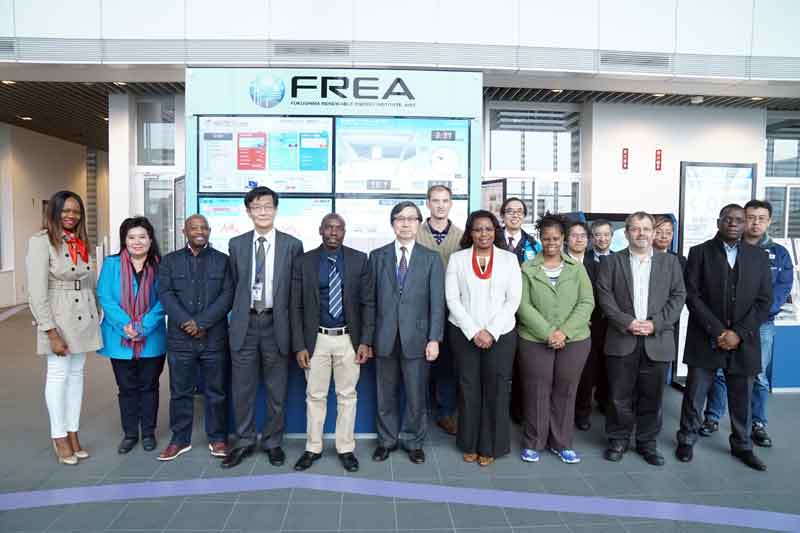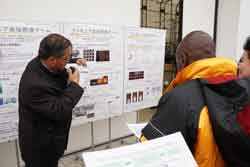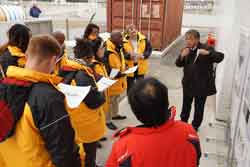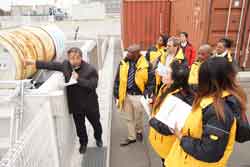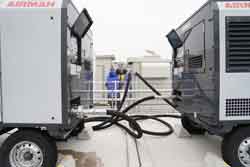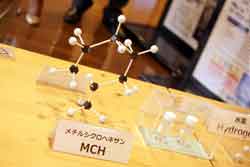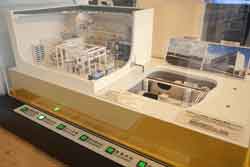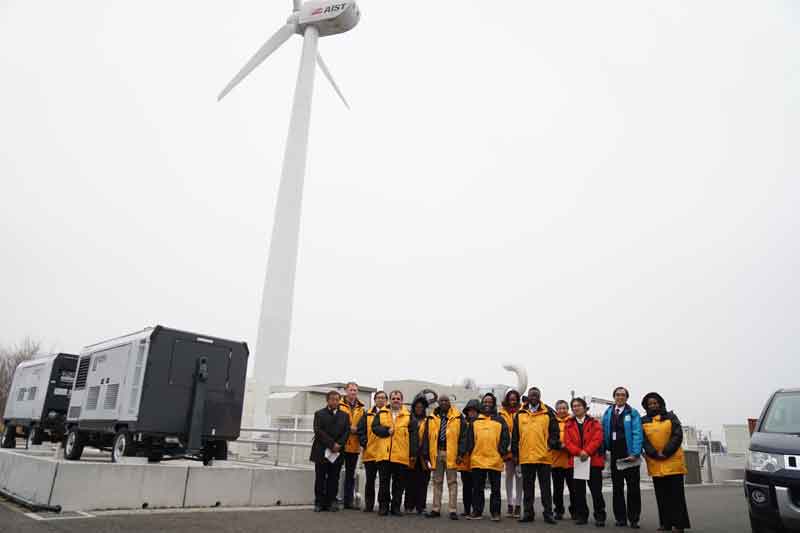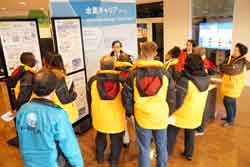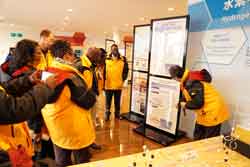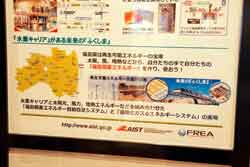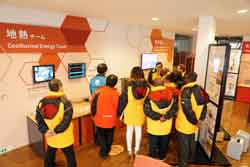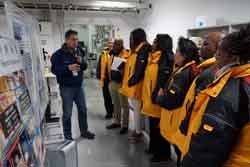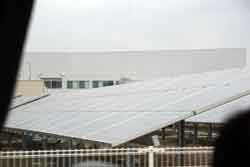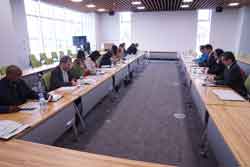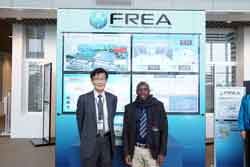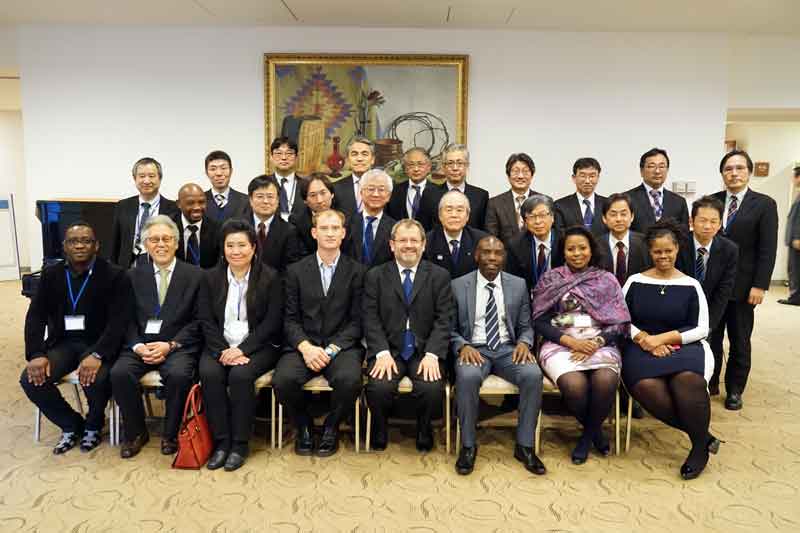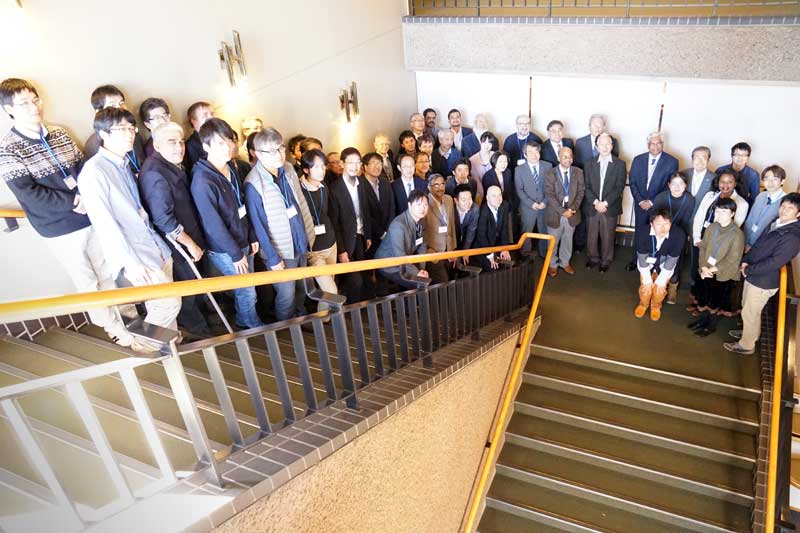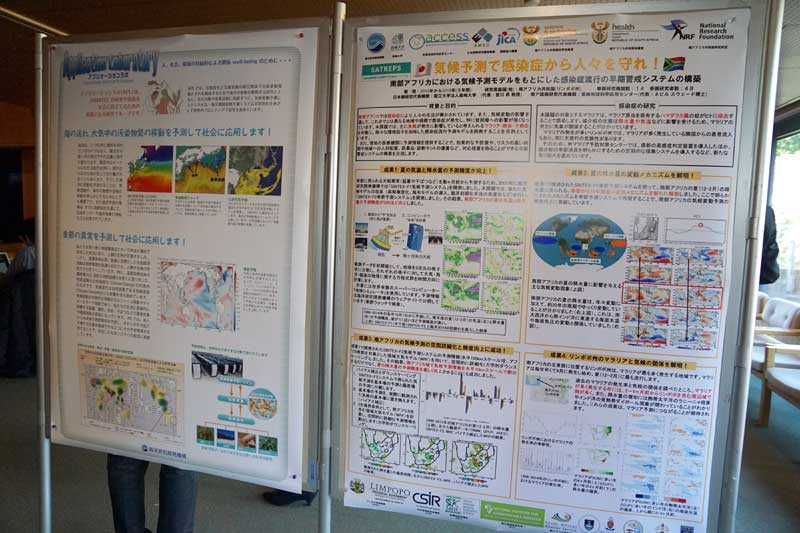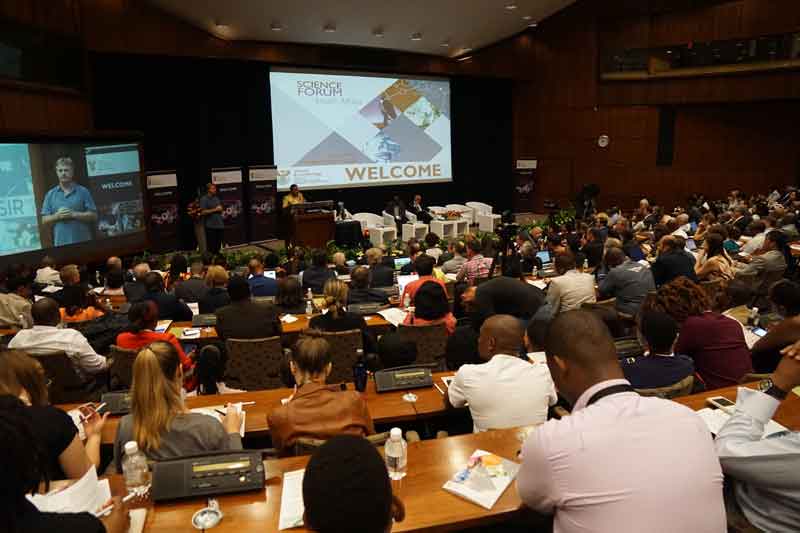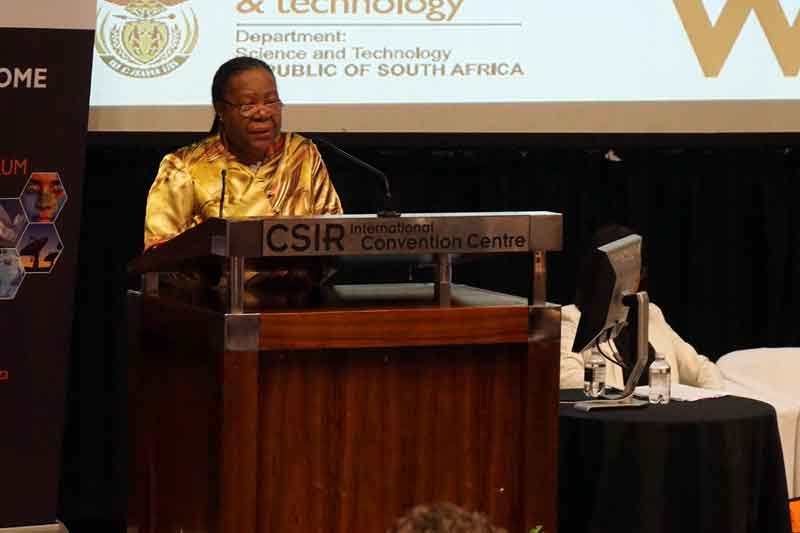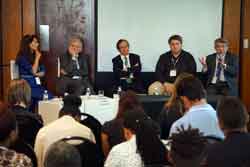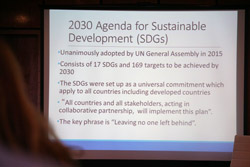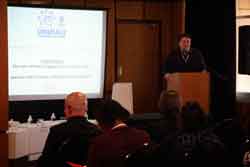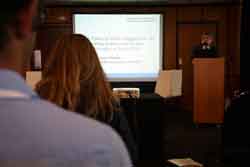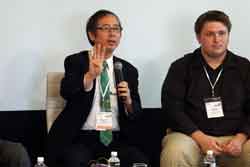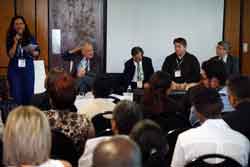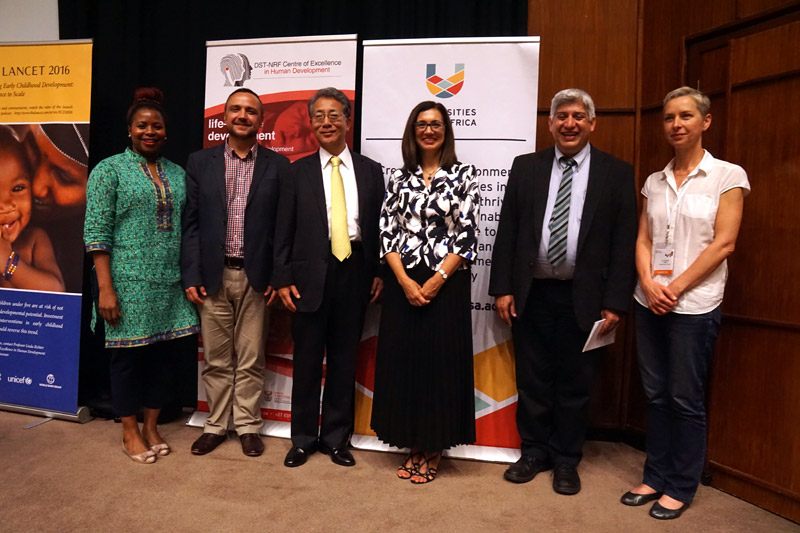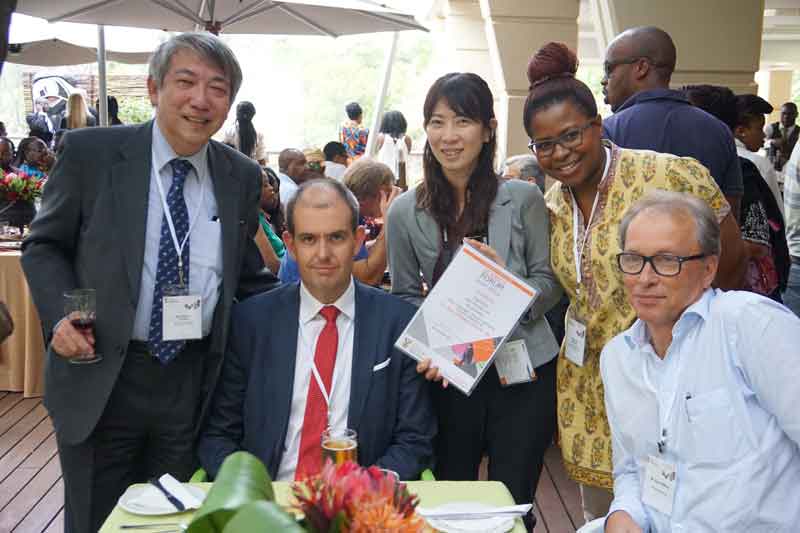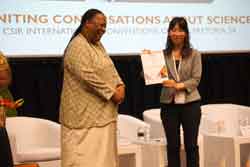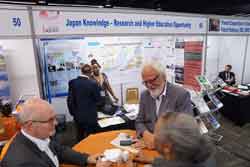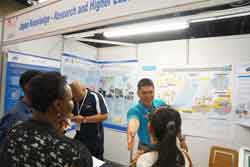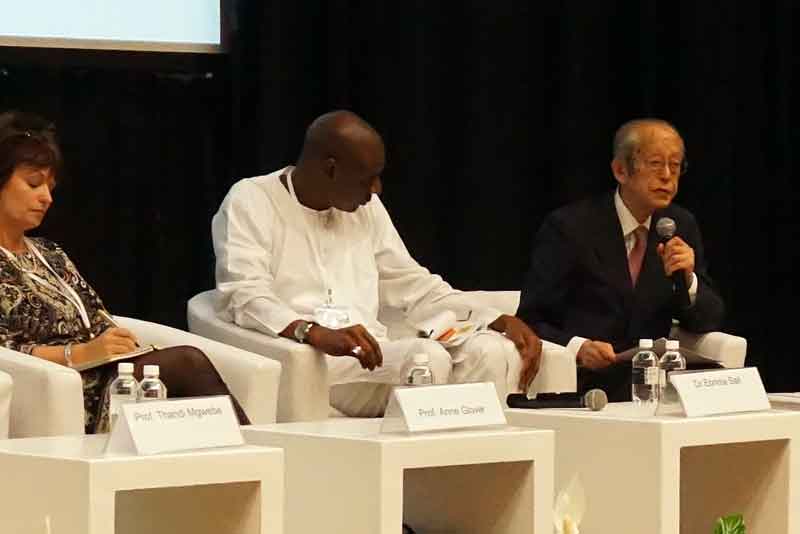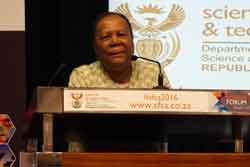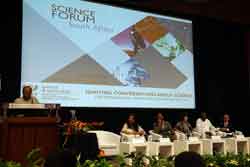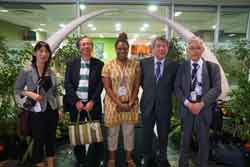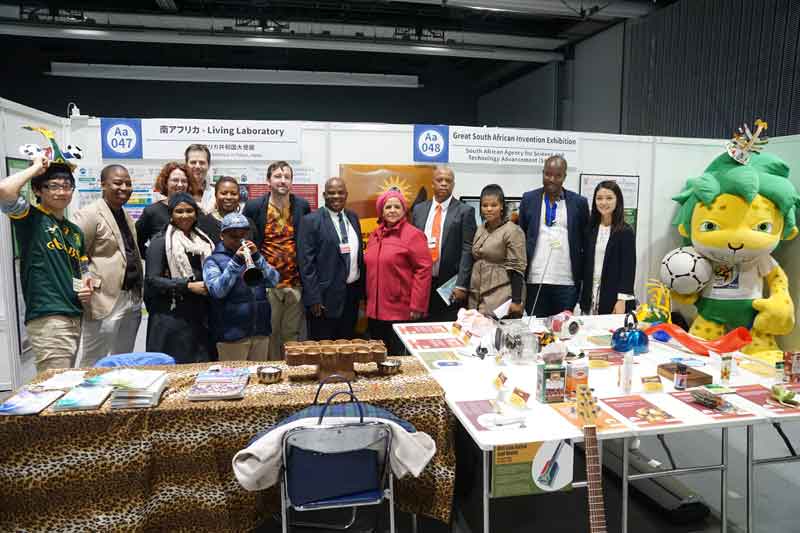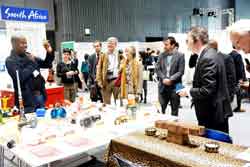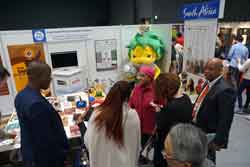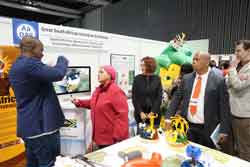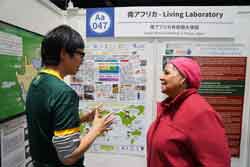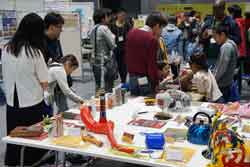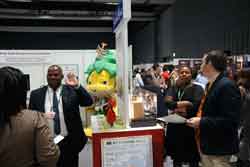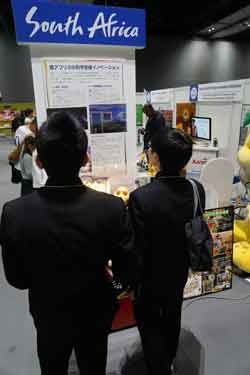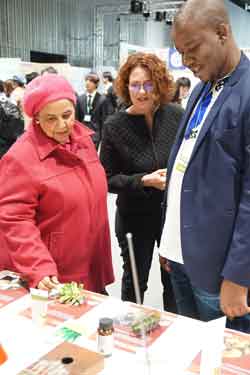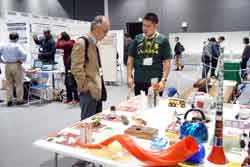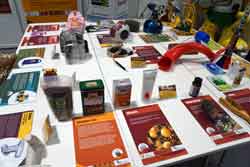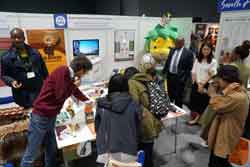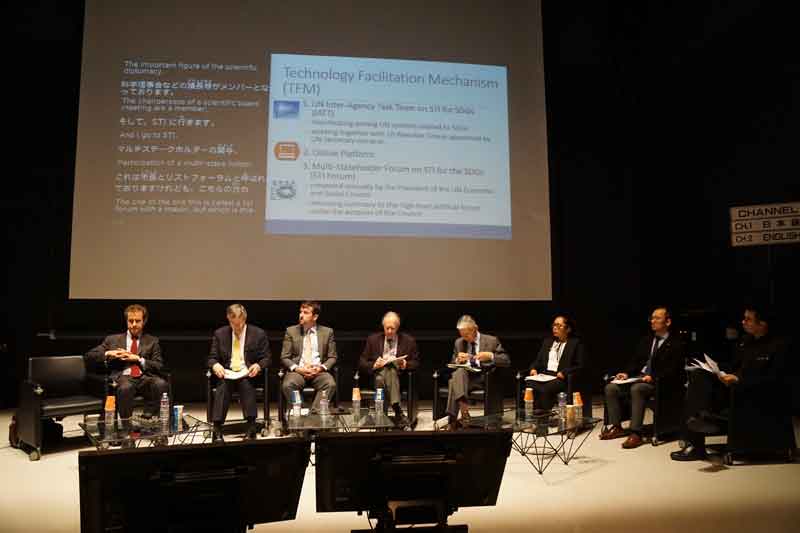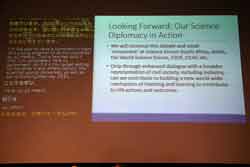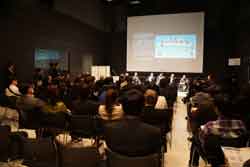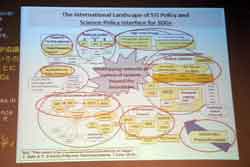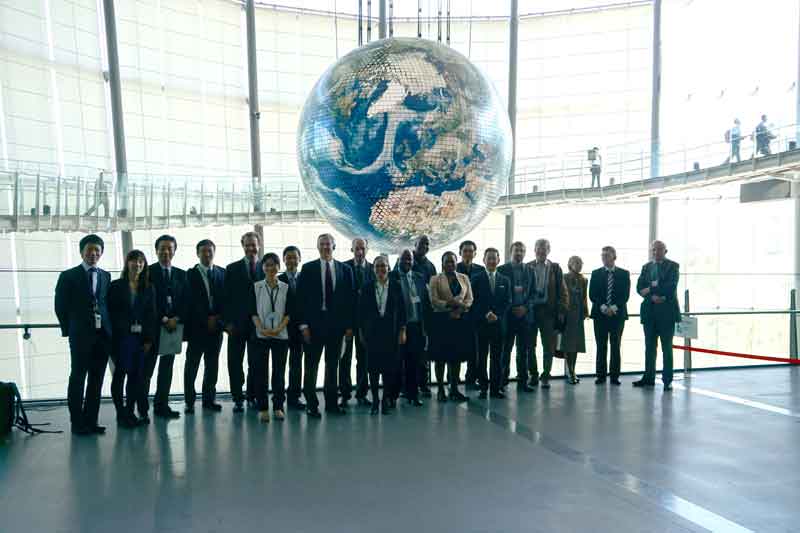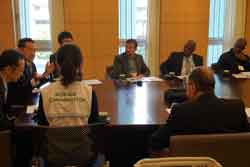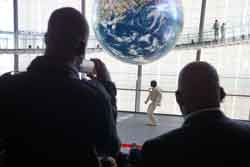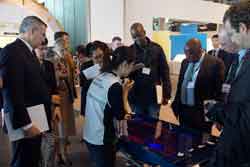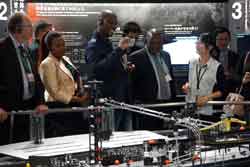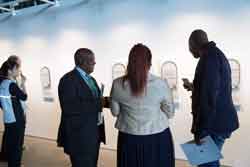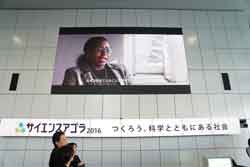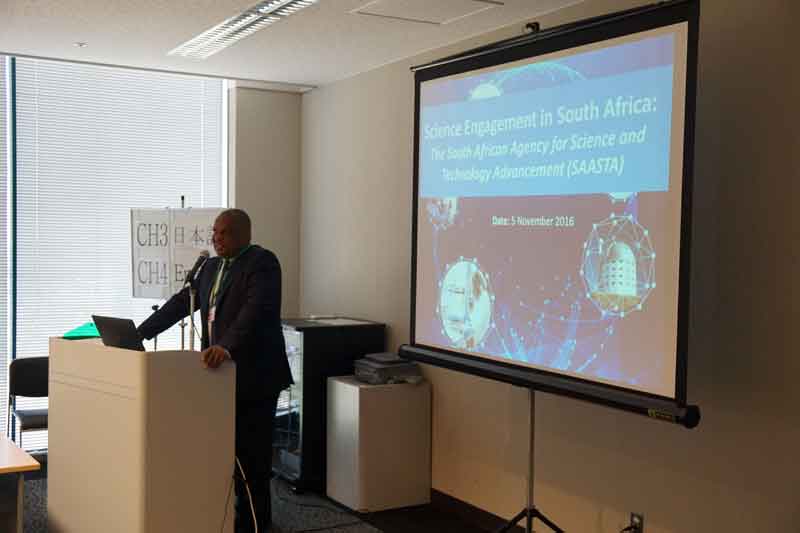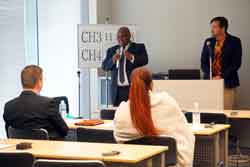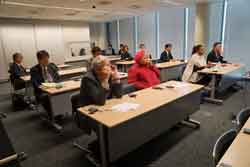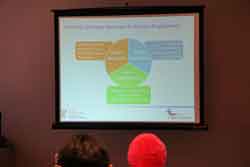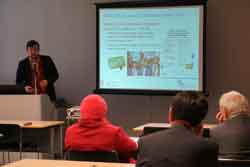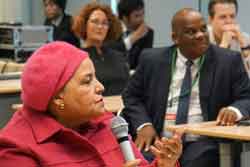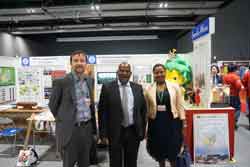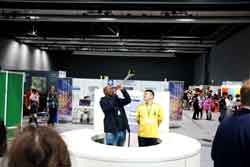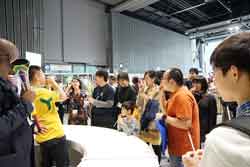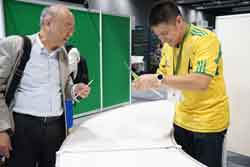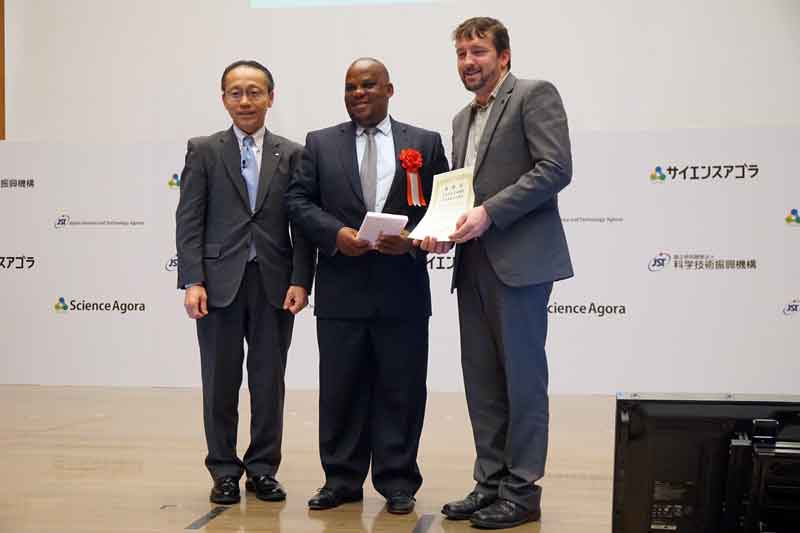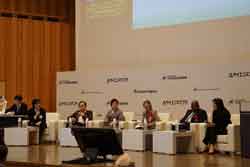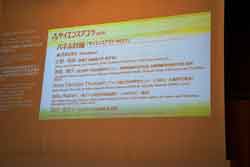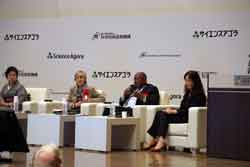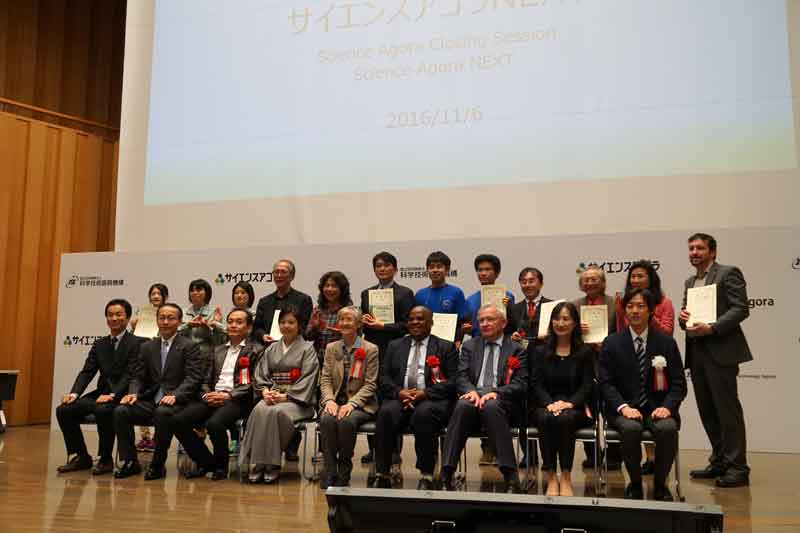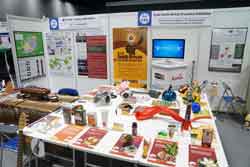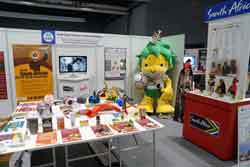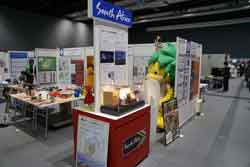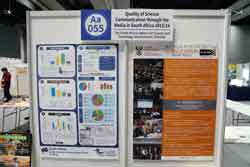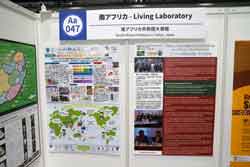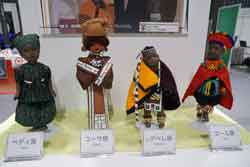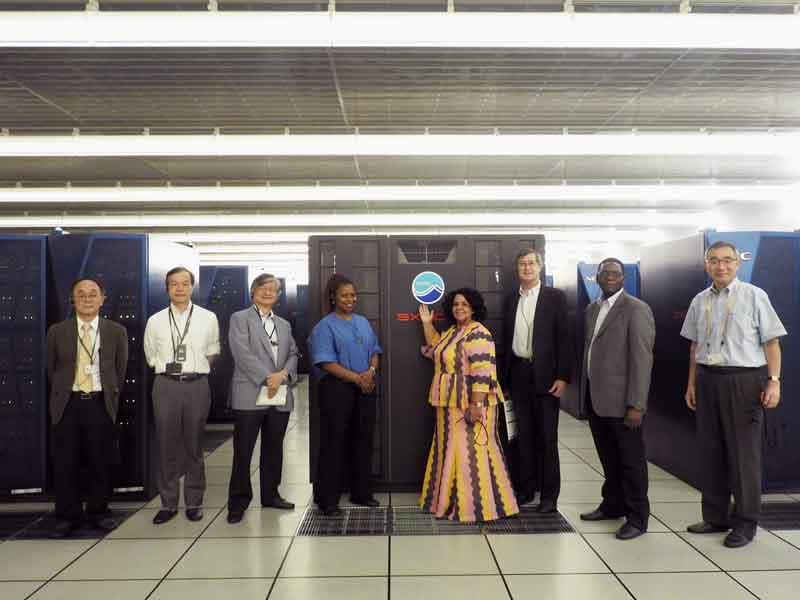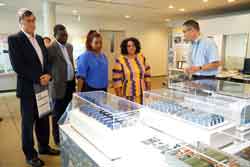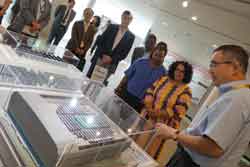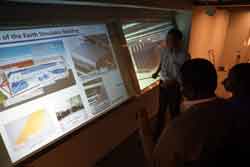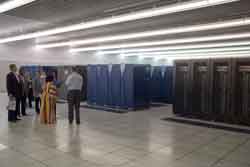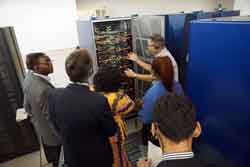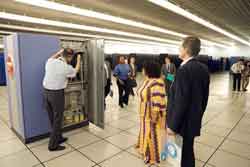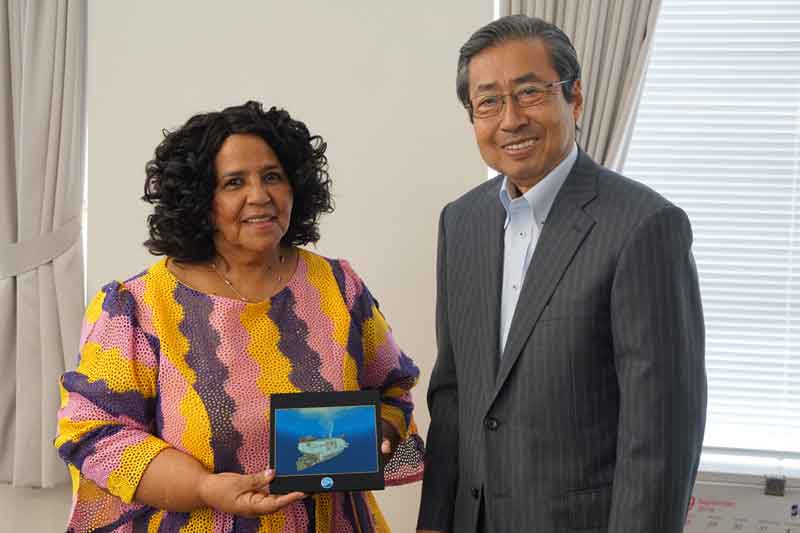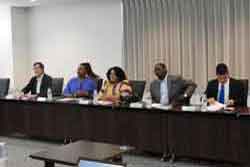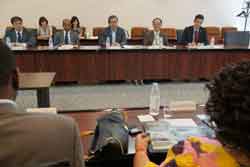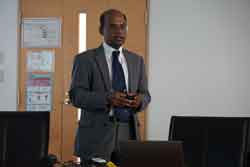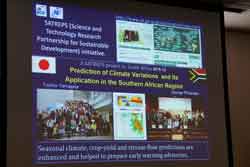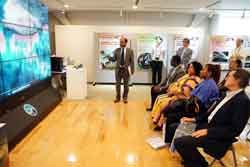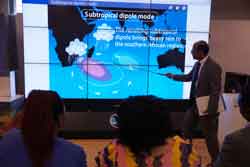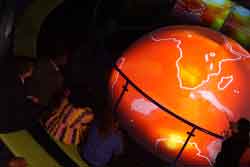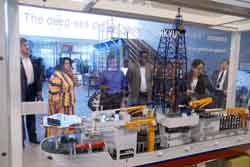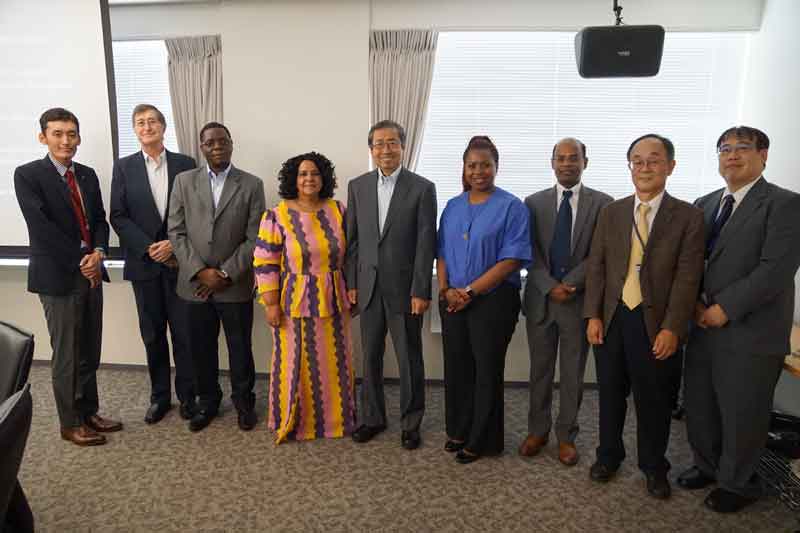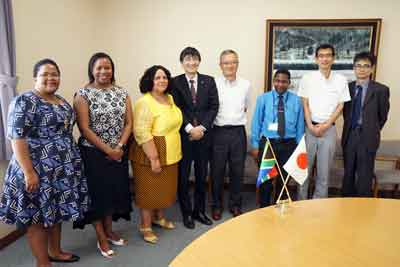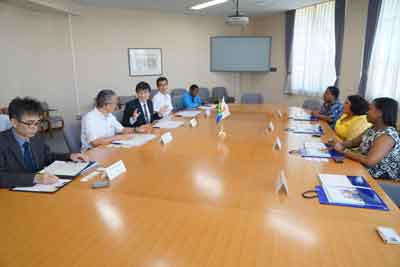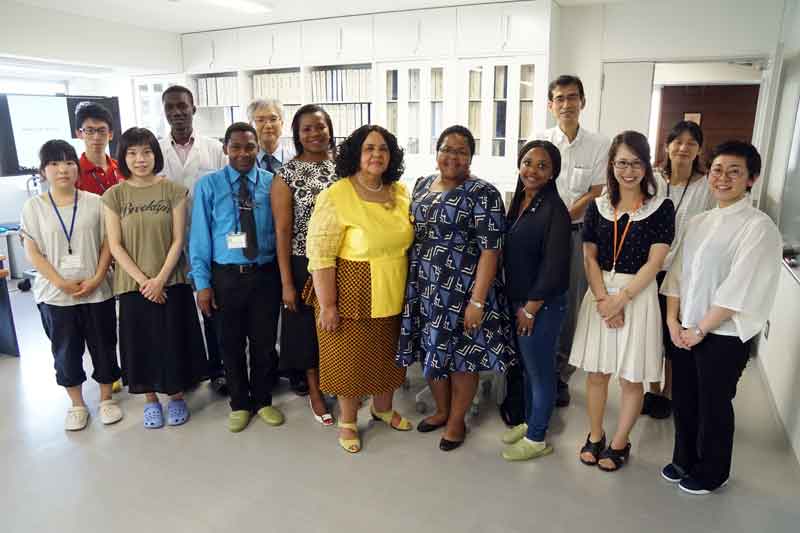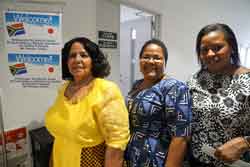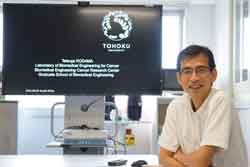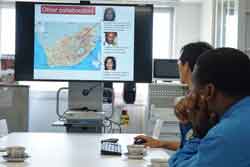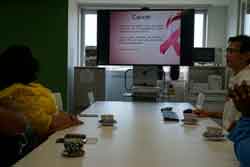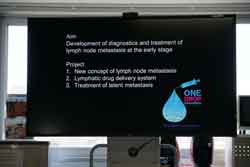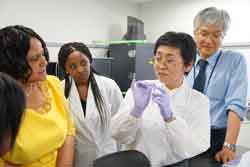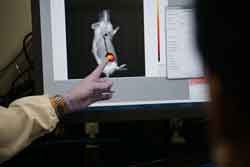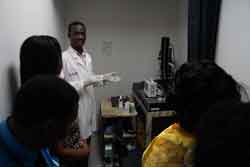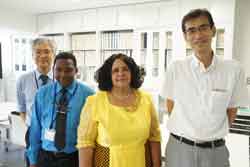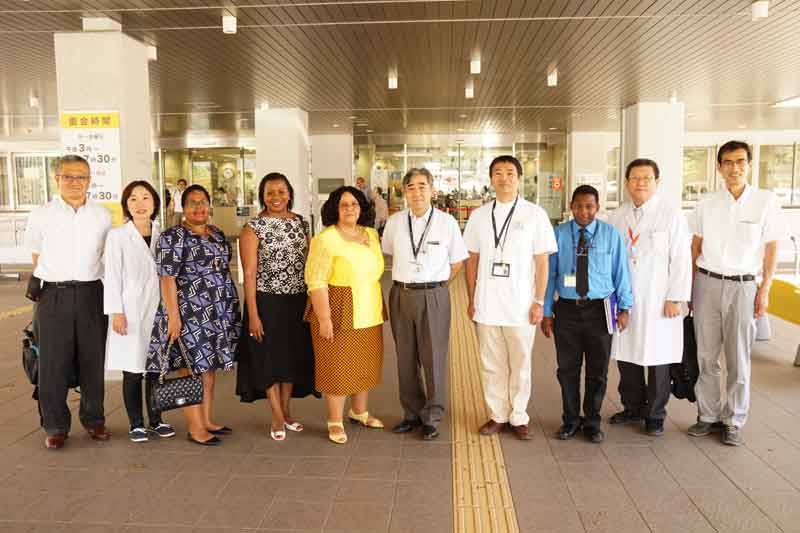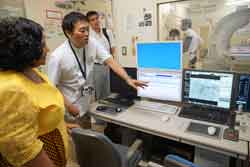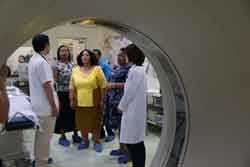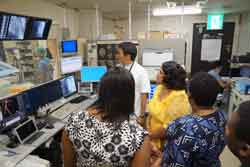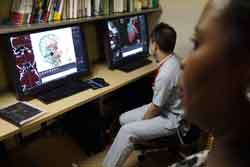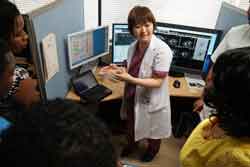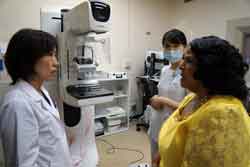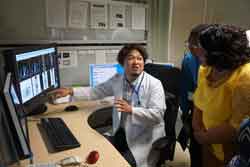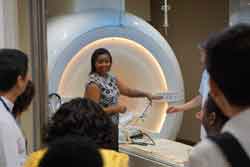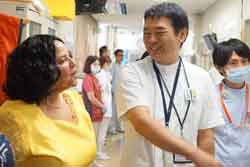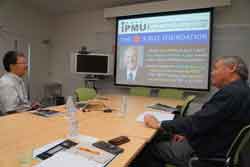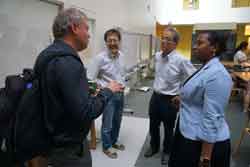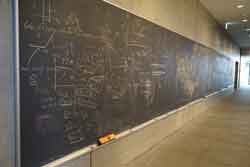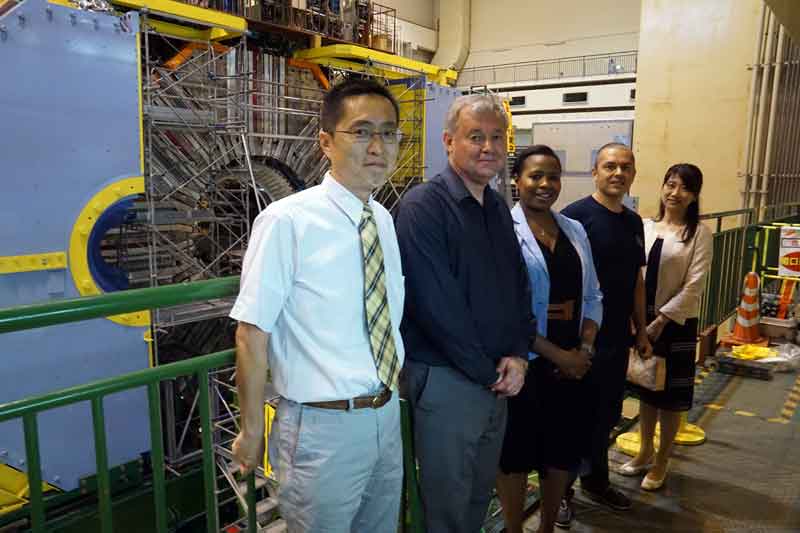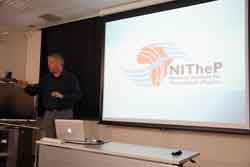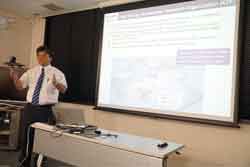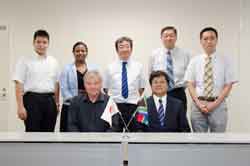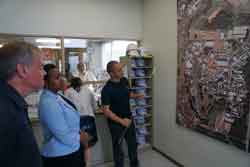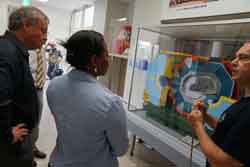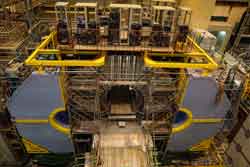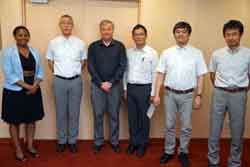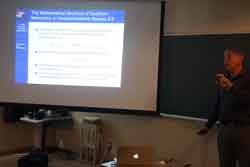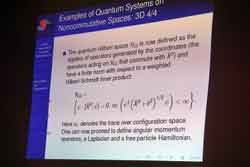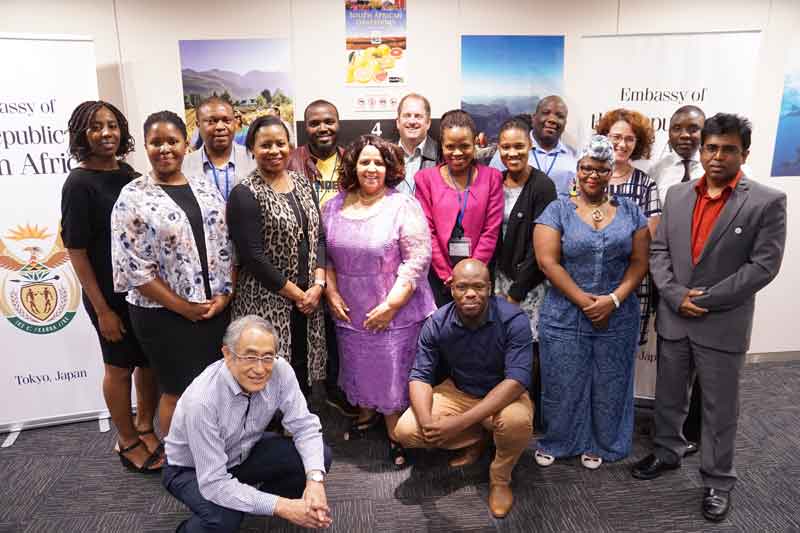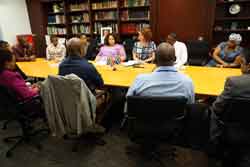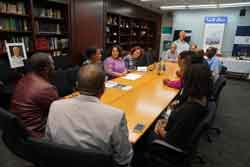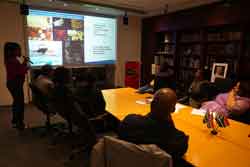02 March 2017
Visit to FREA
The SA's Hydrogen and Fuel Cell Technical delegation from South Africa visited the Fukushima Renewable Energy Institute (FREA) under AIST. FREA was established in 2014 to promote renewable energy R&D post the March 11 'triple disaster' (earthquake, tsunami and nuclear meltdown) that took place in Fukushima. The delegation's visit at FREA focused on the production and utilization of hydrogen energy carrier.
Renewable energy such as sunlight and wind power is clean natural resource which is significantly valuable for Japan due to that most of energy resource consumed in Japan is imported from foreign countries. However, since renewable energy is unstable and/or quite dependent on weather and place, amount of electric power acquired with renewable energy is also unstable. Production technologies of hydrogen energy carrier are water electrolyzation technology to produce hydrogen with such unstable electric power, and chemical energy conversion technology of electrolyzed hydrogen with catalyst. These technologies are necessary to introduce a large amount of renewable energy.
28 February 2017
SA-SIP Workshop on Solar to Hydrogen
A joint workshop on "Solar to Hydrogen" was held between South Africa and the SIP Energy Carrier Programme from Japan. The purpose of the workshop was to exchange technical information on research activities and possible collaborative areas between South Africa and Japan. Hydrogen is the most abundant element in the universe.
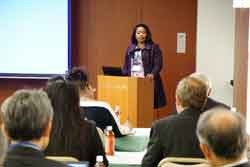 |
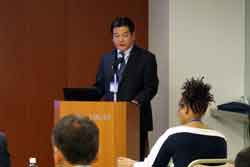 |
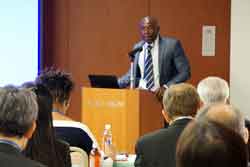 |
| Welcome Remarks by Ms Eudy Mabuza, Minister Counsellor: S&T |
Opening Remarks by Mr Eizo Matsumoto, Deputy Director General, Science, Technology and Innovation, Cabinet Office, JAPAN |
Opening Remarks by Mr. Mmboneni Muofhe, Deputy Director General, Technology Innovaiton, Department of Science and Technology, SOUTH AFRICA |
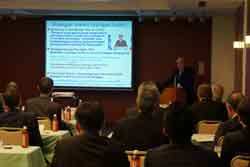 |
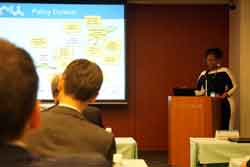 |
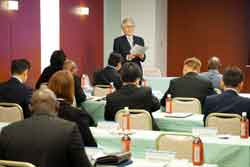 |
| Keynote Address by Mr. Shigeru Muraki, Programme Director, SIP Energy Carrier Programme, JAPAN |
Keynote Address by Dr. Rebecca Maserumule, Chief Director: Hydrogen and Energy, Department of Science and Technology, SOUTH AFRICA |
Moderated by Dr. Kenichi Aika, Programme Sub-director, SIP Energy Carrier Programme, JAPAN |
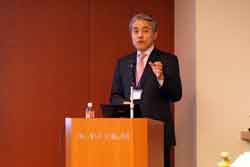 |
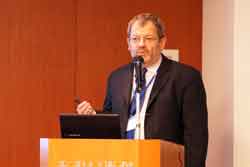 |
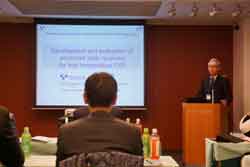 |
| Solar Thermal Energy Presentation by Prof. Yukitaka Kato, Research Laboratory for Nuclear Reactors, Tokyo Institute of Technology, JAPAN |
Solar Thermal Energy Presentation by Mr. Thomas Roos, Principal Research Engineer, Council for Scientific and Industrial Research (CSIR), SOUTH AFCIA |
Solar Thermal Energy Presentation by Mr. Kazuto Noritake, Assistant General Manager, Toyota Industries Corporation, JAPAN |
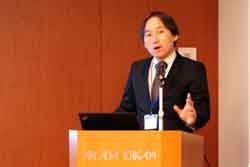 |
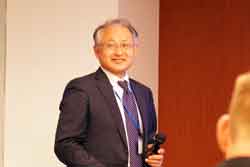 |
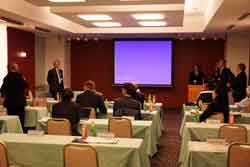 |
| Solar Thermal Energy Presentation by Dr. Yoshiki Okuhara, Senior Researcher, Japan Fine Ceramics Centre, JAPAN |
Moderated on Solar Thermal Energy Session by Dr. Kazuo Yoshida, Executive Research Fellow, Research and Development Division, The Institute of Applied Energy, JAPAN |
Q&A Session |
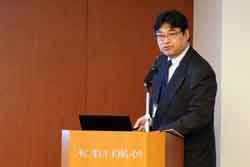 |
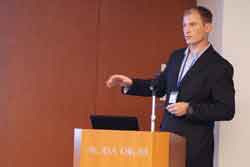 |
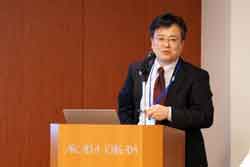 |
| Hydrogen Production Presentation by Dr. Nariaki Sakaba, Division Head, Hydrogen Hydrogen Application Research & Development Division, HTGR Hydrogen & Heat Application Research Centre, Japan Atomic Energy Agency (JAEA), JAPAN |
Hydrogen Production Presentation by Dr. Gerhard Human, Programme Manager, HySA: Infrastructure CoC (North West University), SOUTH AFRICA |
Hydrogen Production Presentation by Prof. Hiroshige Matsumoto, International Institute for Carbon-Neutral Energy Research (I2CNER), Kyushu University, JAPAN |
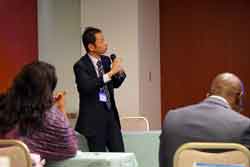 |
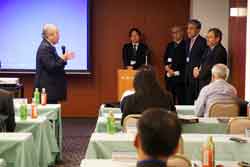 |
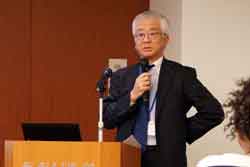 |
| Moderated on Hydrogen Production Presentation by Prof. Mikihiko Nomura, Department of Applied Chemistry, Shibaura Institute of Technology, JAPAN |
Q&A Session |
Moderated on Discussion Session by Mr. Bunro Shiozawa, Programme Sub-director, SIP Energy Carrier Programme, JAPAN |
As an energy carrier, it can be a zero-emission fuel from creation to consumption. South Africa has an abundance of solar radiation which could be used to produce hydrogen gas. Currently, the infrastructure does not exist to produce and store clean hydrogen at large scale, making it too expensive to be a viable option. With Japan's commitment to integrate hydrogen as a key fuel, there is a growing demand and political will to develop commercial-scale hydrogen infrastructure, which provides an opportunity for the two countries to collaborate.
26 January 2017
JAMSTEC International Symposium on "Past, Present, Future of Predicting Ocean and Climate Variability"
Ms Eudy Mabuza, Minister Counsellor: S&T delivered the opening remarks during the International Symposium on "Past, Future of Predicting Ocean and Climate Variability" at the University of Tokyo on 26 January 2017. In addition to the SA-JP joint research on the infectious Diseases Early Warning System "iDEWS", this symposium explored climate application studies such as monsoon variability and predictability, estimation of crop yields, and climate processes and air-sea interactions.
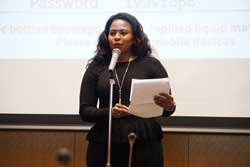 |
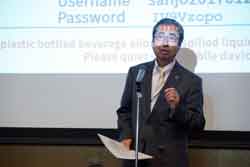 |
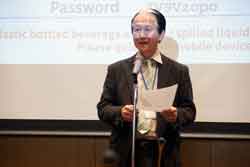 |
| Ms. Eudy Mabuza, Minister Counsellor:S&T |
Dr. Asahiko Taira, President, JAMSTEC |
Dr. Toshio Yamagata, Director, Application Laboratory |
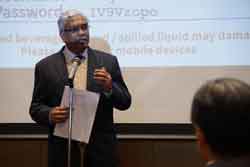 |
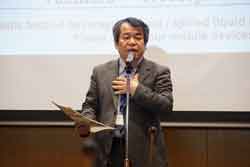 |
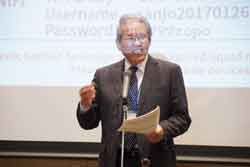 |
| Dr. Rajeevan M. Nair, Ministry of Earth Sciences, India |
Dr. Kaname Kanai, JICA |
Prof. Haruo Watanabe, AMED |
08-09 December 2016 @Pretoria, SA
Science Forum: South Africa
The second Science Forum South Africa opened this morning at the CSIR International Convention Centre in Pretoria to a packed audience. More than 1,600 people are attending the platform which has become a premier forum for scientific debate. Delegates have come from across the world to participate in the open forum, which this year takes place under the theme "Igniting conversations about science".
Minister of Science and Technology Naledi Pandor opened the proceedings, saying the forum, "seeks to build on our objective of providing a vibrant support base for the expansion of research and innovation on the African continent in partnership with the global science community." Minister Pandor said that the continent's research community faced many challenges. "African research lags behind in most science disciplines. We have too few scientists, inadequate publication and innovation achievements, and poorly resourced science institutions." read more...
Japan Science and Technology Agency (JST) organised a parallel session The Power of Public Engagement for Cultivating Science and Society Breakthroughs to Tackle SDGs
Science without proper public engagement remains incomplete. Public Engagement is all about “igniting conversations about science” in many levels and it’s an essential medium to make science transforming society by bridging scientists, policy makers, industrialists, and general publics. This talk brings together key drivers from Africa, Asia and Europe shaping the latest thinking on the global stage. read more...
Pre Event: SAJU Forum Pre-Launch
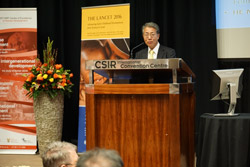 |
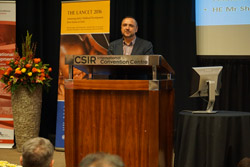 |
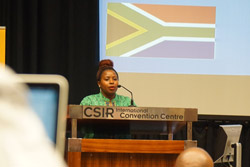 |
| H.E. Mr Hiroki, Ambassador of Japan |
Dr Aldo Stroebel, NRF |
Ms Mabuza, Minister Counsellor |
Around Forum
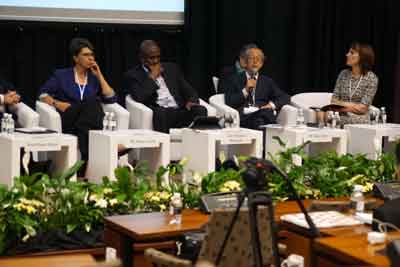 |
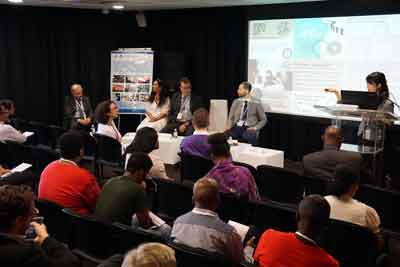 |
Mr Omi, Chairman of the STS Forum, made remarks on the Contribution of Science Diplomacy to Africa's Development |
Ms Kawazoe, JST, promoted Science Agora during the Forum of Fora |
Exhibition
The Embassy of Jpaan in South Africa with Team Japan's "Japan Knowledge-Research and Higher Education Opportunity" Exhibition
won the runner-up SFSA 2016 Exhibition Award.
Closing Session
Mr Omi delivered the clsoing remarks and Miniter Pandor
03-06 November 2016
The Mission participated at the Science Agora 2016 @Miraikan
The Embassy and South African Agency for Science and Technolgoy Advancement (SAASTA) participated at the Science Agora 2016 around Miraikan (The National Museum of Emerging Science and Innovation) from 03 to 06 November 2016. Science Agora is an open arena for people from different sectors who desire a future society consistent with science organised by Japan Science and Technology Agency (JST). This year with the themes of: (1) new medical care, food, and life that will be created by advanced science; (2) collaboration between education, culture, art and sports, and science; and (3) the future role of science, looking at lessons learnt from the 11 March, the tripple disaster reconstruction. This year's Science Agora attracted over 9,000 people over the period of four days.
Mr Michael Ellis from SAASTA was a part of the panelists for one of the keynote address, titled "What can STI contribute to the global issues today such as SDGs we have to cope with?" hosted by JST on 03 November at Miraikan.
On 04 Nov, Miraikan tour for the keynote speakers.
On 05 Nov, SAASTA did a talk session "Public Science Engagement in South Africa" at JAASO.
During our dialogue session on 06 Nov, guests enjoyed making their own vuvuzela with a straw and blowing their vuvuzela.
On 06 Nov, Dr Jabu Nukeri, Executive Director of SAASTA, made comments on the Science Agora Closing Session-Science Agora NEXT. SAASTA also received the JASSO International Award for their exhibition "Great South African Invention".
12 September 2016
Visit to the High Performance Computing Facility of JAMSTEC
Ambassador Sisulu paid a courtesy call to the President of Japan Agency for Marine-Earth Science and Technology (JAMSTEC) Dr Taira.
Ambassador used the opportunity to learn more about the joint research collaboration between South Africa and Japan on the following project: "Predictions of Climate Variations and its Application in the Southern African Region". The objective of the project was to use a high-resolution ocean-atmosphere coupled model (SINTEX-F) (a virtual earth on the Earth Simulator supercomputer that reproduces interactions between the atmosphere and oceans) to predict global climate variations up to one year in advance. The prediction results are now used to conduct downscaling seasonal prediction for southern Africa to provide an early warning system of an outbreak of infectious diseases (IDEWS) / 南部アフリカにおける気象予測モデルをもとにした感染症流行の早期警戒システムの構築.
Please visit to the IDEWS website, for more information.
09 August 2016
Visit to Tohoku University
Ambassador Sisulu paid a courtesy visit to the Executive Vice President of Tohoku University Prof Toshiya Ueki on 09 August 2016.
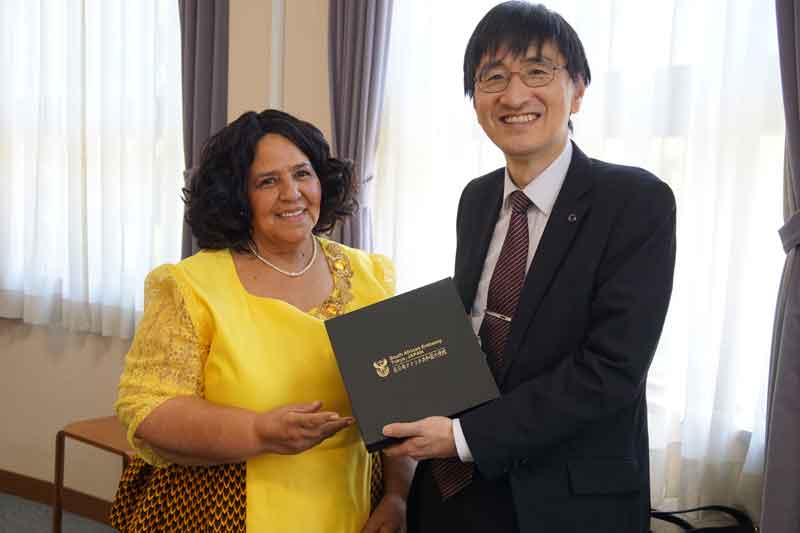
During her visit, Ambassador Sisulu visited the Kodama Laboratory where she learnt more about the research collaboration taking place between South Africa and Japan on cancer treatment. Ambassador learnt that the University of Johannesburg led by Professor Oluwafemi Oluwatobi together with Tohoku University led by Professor Tetsuya Kodama have a long standing joint research project that is currently funded by the NRF and JSPS, the project is titled "Development of photo-thermal cure for involved lymph node by auri-nano-rod and near infrared ".
The project focuses on metastasis, a characteristic of many tumor types, that are estimated to be responsible for the death of 90% of all patients with cancer. However, effective treatment of metastasis has not been established. In the Kodama laboratory, the research focuses on the early diagnosis and treatment of lymph node metastasis, often observed in breast cancer, head and neck cancer. Though this joint collaboration the team has reported their research activities to the world and are in the stage where they will carry out clinical trials.
Ambassador Sisulu also visited the Tohoku University Hospital which is the medical hub to the Tohoku Region and aiming for a harmony between patient-friendly care and advanced medicine. Their doctors introduced their latest medical equipment and diagnostic approaches.
04-05 August 2016
NITheP Visit
Professor FG Scholtz the Director at the National Institute for Theoretical Physics (NITheP) from South Africa visited Tokyo on 04 to 05 August 2016 to explore collaboration possibilities with the following institutions: KEK in Tsukuba, IPMU & ISSP at the University of Tokyo and Keio University. These institutions have large theoretical physics groups in Japan and are natural partners for NITheP.
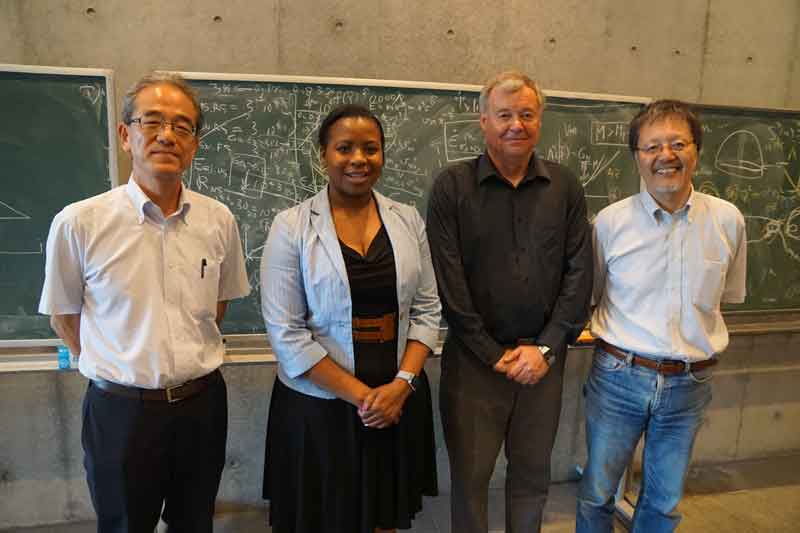
The Kavali Institute for the Physics and Mathematics of the Universe (IPMU) at the University of Tokyo. The Kavli IPMU is founded as an international research institution addressing fundamental questions about the universe. What is the universe made of? How did it begin, and what is its fate? What are the laws that govern it, and why do we exist in it? These are basic questions for all humanity, as reflected in the thoroughly international and interdisciplinary character of Kavli IPMU.
The High Energy Accelerator Research Organization, known as KEK, is a Japanese organization whose purpose is to operate the largest particle physics laboratory in Japan, situated in Tsukuba, Ibaraki prefecture.
The Institute for Solid State Physics (ISSP) at the University of Tokyo. The ISSP was established by the Japanese government to carry out basic research with a specific goal to develop advanced experimental techniques that were rather difficult to achieve in most university laboratories. Lastly, Prof Scholtz delivered a lecture titled “A Brief Overview of Quantum Mechanics on Noncommutative Spaces". The lecture was attended by a group of post-doctoral fellows from Keio University.
25 June 2016
JASSO Study Abroad Fair 2016
The Science and Technology office participated in this year's Study Abroad Fair organised by Japan Student Services Organization (JASSO). The Office participated by promoting South African universities to Japanese high school students to consider South Africa as their preferred destination.
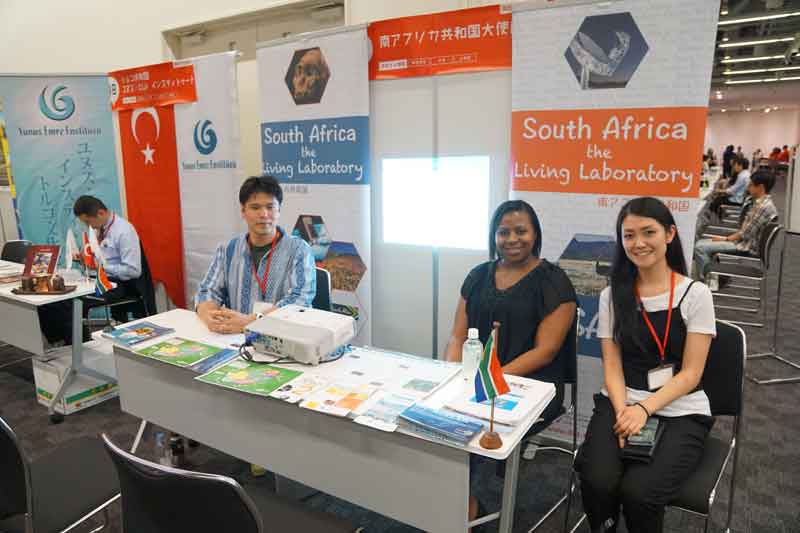
JASSO is an independent administrative institution established under the Ministry of Education, Culture, Sports, Science and Technology (MEXT - Monbukagakusho). JASSO comprehensively administers scholarship loan, support programs for international students, and support programs for Japanese students. The purpose of these programs is to foster the development of creative individuals who will be rich in humanism and are likely to become the leaders of society in the next generation, while at the same time promoting international understanding and exchange.
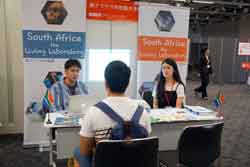 |
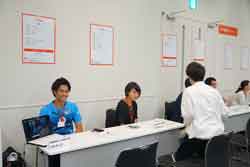 |
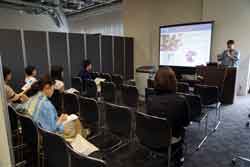 |
|
Counselling by Mr Shun Yamasaki
Graduate from University of Pretoria |
Seminar by Mr Tanaka,
Liaison Officer:S&T |
21 June 2016
SANSA technical expert visit to Japan
A delegation from South Africa is in Japan for Earth Observation training from 12 June to 09 July. The delegation is from the following institutions in SA: South African National Space Agency (SANSA), South African Marine Safety Agency (SAMSA), Transnet Port Authority (Durban and Port Elizabeth), Department of Agriculture, Forestry and Fisheries (DAFF), Agricultural Research Council (ARC), Department of Water and Sanitation (DWS) and Statistics South Africa (StatsSA).
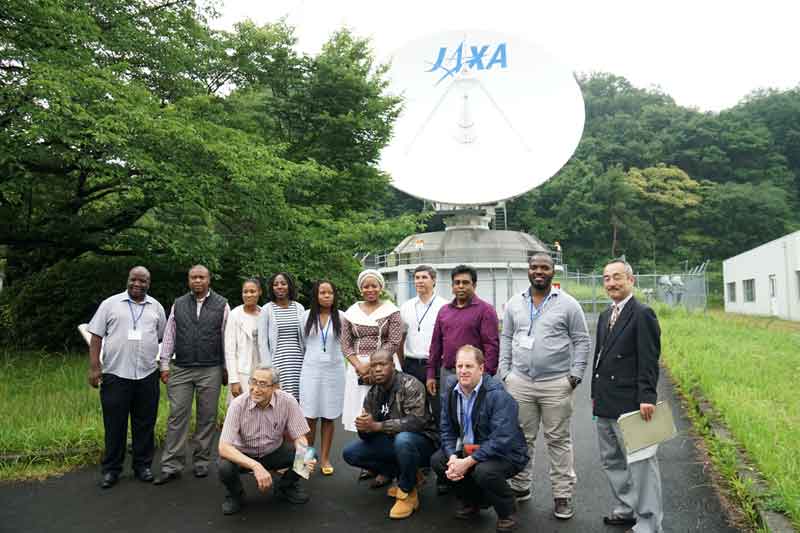
The SANSA signed a formal agreement with the Japan International Cooperation Agency (JICA) in June 2014 to champion cooperation in peaceful use of remote sensing and Earth observation technologies. The formal agreement benefits and exposes to SANSA staff members and the South African earth observation community to Japanese expertise and skills. It also promotes utilization and improved knowledge about JAXA’s (Japan Aerospace Exploration Agency) ALOS/PALSAR satellite data.
The SANSA-JICA framework agreement includes the secondment of Mr. Kentaro Yoshikawa from JICA as a Senior Advisor at SANSA Earth Observation directorate in September 2014, as well as senior official's training in Japan. Minister Counsellor Mabuza joined the delegation at the Earth Observation Center (EOC), operated by the Remote Sensing Technology Centre of Japan (RESTEC), located in Hatoyama Town, Hiki County, Saitama Prefecture.
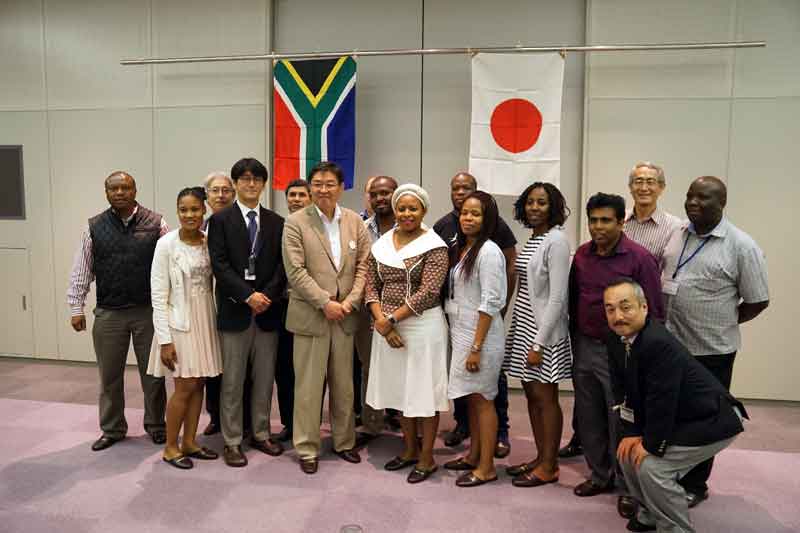 |
| With Mr Komine, Town Mayor of Hatoyama town, Saitama Prefecture |
On 29 June, the delegation paid a courtesy visit to Ambassador Sisulu at the South Africa Embassy.
20 May 2016
IDEWS delegation visit to Japan
A research and development unit of “Establishment of an Early-warning System for Infectious Diseases in Southern African Incorporating Climate Prediction (IDEWS)” paid a courtesy call on Ambassador Beryl Sisulu on 20 May 2016. Dr Neville Sweijd from South Africa’s Applied Centre for Climate & Earth Systems Science (ACCESS) introduced the outline, progresses and prospective of the on-going five-year project since 2013 under the Science and Technology Research Partnership for Sustainable Development (SATREPS) by JICA and JST.
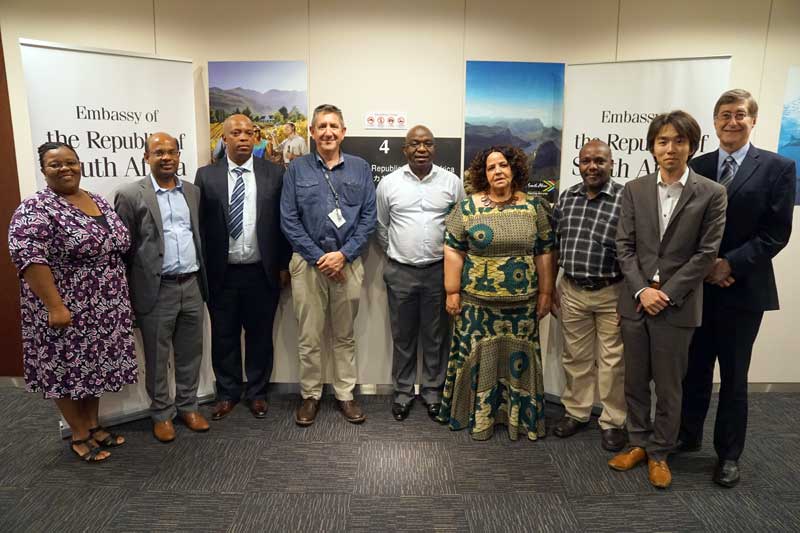
This project is developing an infectious disease outbreak prediction model that incorporates the influences of a variety of environmental factors into the climate change models in order to predict the outbreaks of malaria, pneumonia, and diarrheal diseases such as cholera that are predominantly affected by climate conditions.
With the success of the previous project showing prediction of climate variations in the Southern Africa, the unit can apply climate prediction to appropriate preventative measures during warning periods and in high-risk regions. Furthermore, climate prediction can expand to improve food, energy, and water security with the relevant organisations in South Africa.
This partnership provides human capital development and training courses to researchers and governmental officials mainly in Limpopo, then expanding to other regions.
South African participants are ACCESS, South African Weather Services, CSIR, Medical Research Council, National Institute for Communicable Diseases, University of Limpopo, University of Venda, and University of Pretoria.
From Japan, Institute of Tropical Medicine at Nagasaki University and Japan Agency for Marine-Earth Science and Technology (JAMSTEC) are participating.
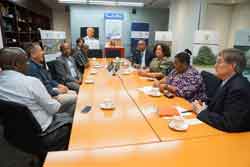 |
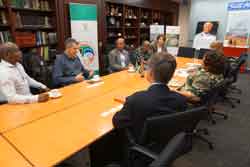 |
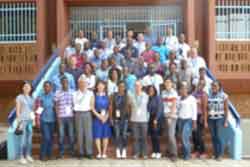
Lecture Series at University of Limpopo |

